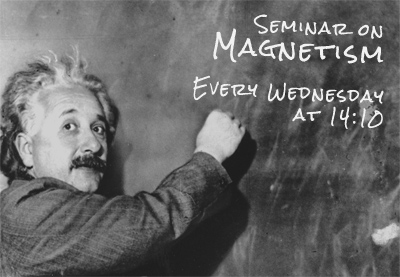Seminar on Magnetism
Group of Magnetism at the Department of Condensed Matter Physics
of Charles University and MGML has a pleasure to invite you to attend the joint seminar
on 21st February 2024 at 14:10
at Faculty of Mathematics and Physics of Charles University, Ke Karlovu 5, 121 16 Praha 2
Lecture room F2
Andrej Pustogow
TU Vienna, Austria
New Spin on Mott Insulators and Quantum Spin Liquids: Stress Reduces Frustration
Andrej Pustogow » New Spin on Mott Insulators and Quantum Spin Liquids: Stress Reduces Frustration
TU Vienna, Austria
https://www.ifp.tuwien.ac.at/forschung/pustogow-research/home
Online link: cesnet.zoom.us Ask R. Colman for password.
Location: Lecture room F2, Ke Karlovu 3
Tuning materials properties on demand is at the heart of condensed matter science. Charge transport and magnetism are strongly linked to the overlap of electronic wave functions and can be, thus, manipulated by varying the electronic bandwidth through chemical substitution or physical pressure. Yet, a controlled variation of the symmetry, anisotropy and frustration of transfer integrals and exchange interactions remained inaccessible so far.
Here, we explore Mott insulators subject to strong antiferromagnetic interactions, where geometrical frustration suppresses magnetic order entirely [1,2] or down to very low temperatures TN << J [3-6]. Utilizing the recent advancements in strain tuning of unconventional superconductors [7,8], we apply uniaxial stress to fine-tune the Mott transition with unprecedented precision in a triangular-lattice compound [2]. Through the slope of the metal-insulator boundary in the temperature-pressure phase diagram we pinpoint the nonmagnetic ground state of the most intensely studied quantum-spin-liquid candidate [1,2]. By applying in situ uniaxial pressure to a clean, well-studied kagome-lattice compound without disorder [3-5], we obtain direct control of antiferromagnetic order within one single crystal [6]. As the applied stress reduces the frustration strength, the transition temperature is enhanced by 10% [6]. Our pioneering endeavors [2,6] demonstrate uniaxial strain as a powerful tool to tune interacting spins on frustrated lattices – towards stabilizing novel, exotic, possibly even quantum entangled spin states.
References
[1] B. Miksch, A. Pustogow, M. Javaheri Rahim, A. A. Bardin, K. Kanoda, J. A. Schlueter, R. Hübner, M. Scheffler, M. Dressel, Science 372, 276-279 (2021)
[2] A. Pustogow, Y. Kawasugi, H. Sakurakoji, N. Tajima, Nat. Commun. 14, 1960 (2023)
[3] P. Puphal, M. Bolte, D. Sheptyakov, A. Pustogow, K. Kliemt, M. Dressel, M. Baenitz, C. Krellner, J. Mater. Chem. C 5, 2629 (2017)
[4] T. Biesner et al., Adv. Quantum Technol. 2022, 2200023 (2022)
[5] D. Chatterjee et al., Phys. Rev. B 107, 125156 (2023)
[6] Jierong Wang, Y.-S. Su, M. Spitaler, K.M. Zoch, C. Krellner, P. Puphal, S.E. Brown, and A. Pustogow, Phys. Rev. Lett. 131, 256501 (2023)
[7] C.W. Hicks et al., Science 344, 283 LP (2014)
[8] A. Chronister et al., npj Quantum Mater. 7, 113 (2022)


